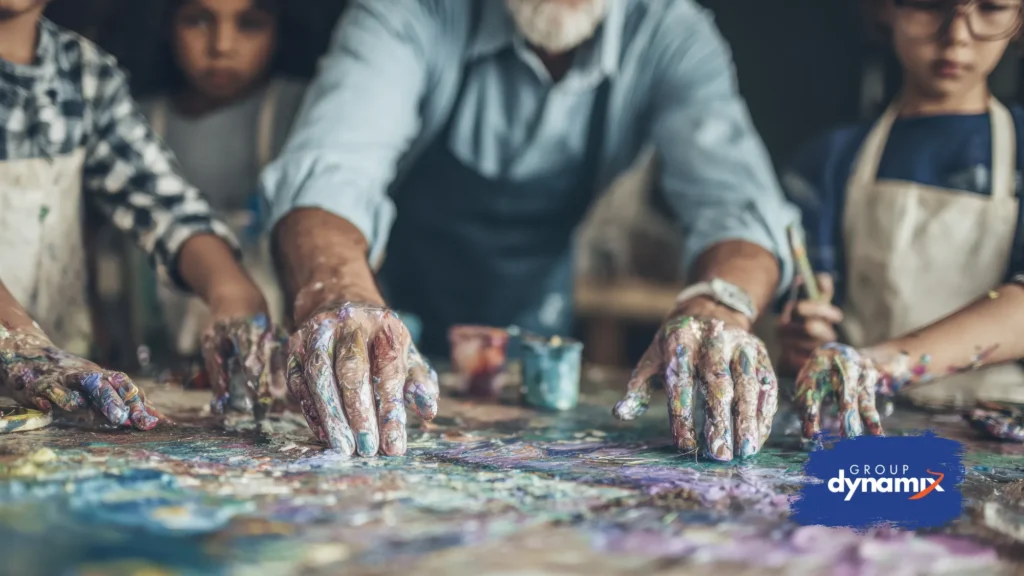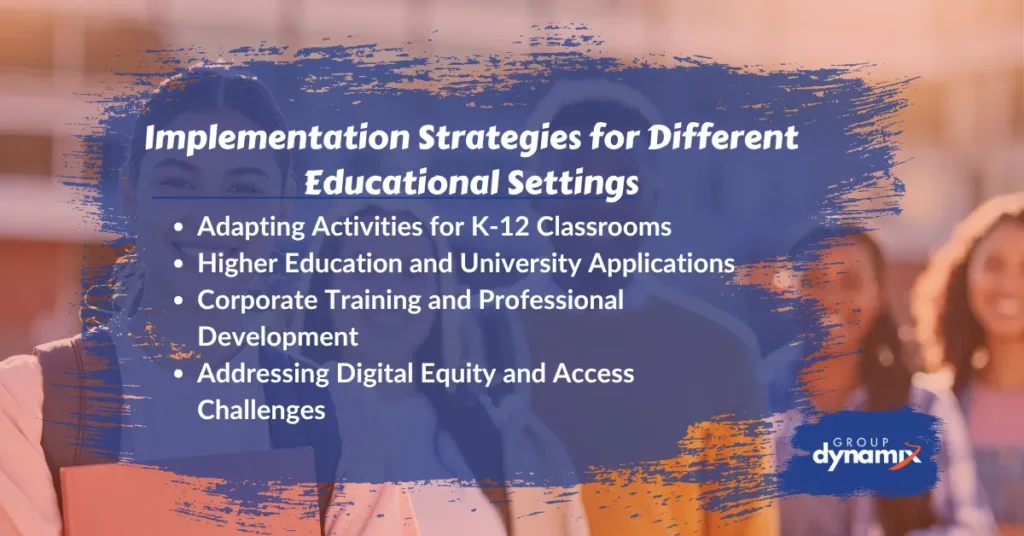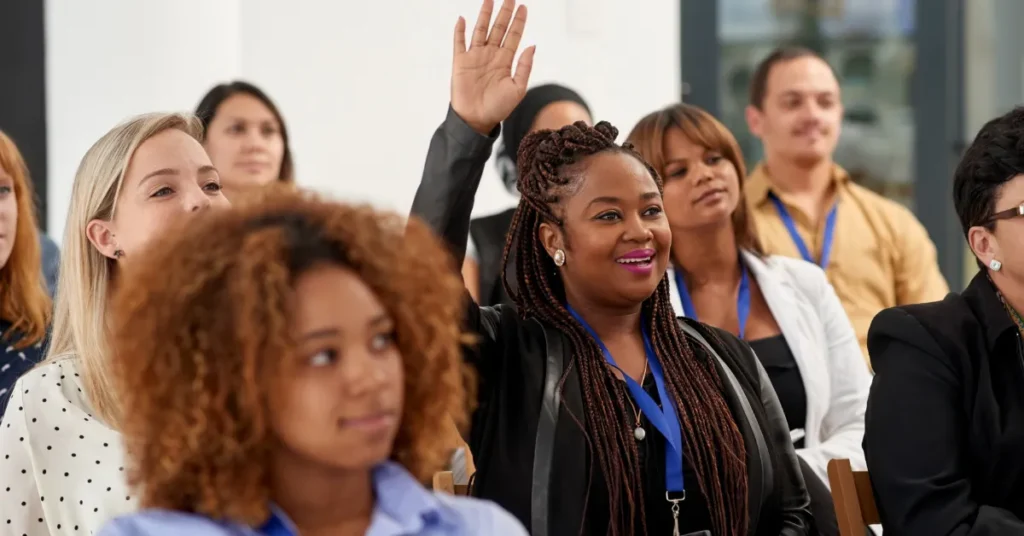Experiential learning isn’t just a trend. It’s a proven method to improve engagement, retention, and real-world readiness across age groups and industries. In 2025, education and corporate training programs are shifting away from passive instruction and toward immersive, hands-on approaches that spark curiosity and deepen understanding. Whether you’re an educator looking to energize your classroom or an L&D professional designing your next training workshop, the activities in this guide will help your learners do, not just listen. And that difference? It’s measurable. Retention rates skyrocket. Skills stick. People grow.
Need help designing activities that actually stick? Group Dynamix offers facilitated experiences that take learning beyond the whiteboard. Book a free consultation to discuss your team’s goals.
Benefits of Corporate Team Building?
Benefits of Corporate Team Building?
TL;DR
Experiential learning activities are hands-on, immersive experiences that help participants retain more knowledge, apply skills in real-world contexts, and stay engaged. In 2025, educators and corporate trainers are turning to methods like role-playing, STEM projects, service learning, and entrepreneurship simulations to drive lasting results. This guide explores proven strategies across education levels and industries—plus implementation tips and barriers to watch out for.
Key Points
- Experiential Learning Works: Retention can hit 90% with experiential methods—far outpacing traditional lectures. This approach connects academic or theoretical content to real-life applications for stronger outcomes.
- Hands-On Activities Build Core Skills: From role-playing and lab experiments to engineering challenges and case studies, these methods develop collaboration, critical thinking, communication, and adaptability.
- Community and Workplace Learning Amplify Results: Internships, service projects, and real-world business simulations provide meaningful context, helping learners grow while solving real problems.
- K–12, Higher Ed, and Corporate Use Cases Are Expanding: Data-backed case studies show boosts in performance, equity, and retention across age groups and sectors when active learning is prioritized.
- Digital Access Is Still a Barrier: While tech-enhanced experiences are on the rise, equity gaps remain. Institutions must address access and infrastructure if experiential learning is to reach its full potential.

Hands-On and Practical Learning Activities
Role-Playing Scenarios and Case Study Analysis
Role-playing activities immerse learners in realistic situations where they must apply knowledge, make decisions, and experience consequences in a safe learning environment. These scenarios develop empathy, perspective-taking, and communication skills while allowing participants to practice complex interpersonal interactions. Whether simulating historical events, business negotiations, or social conflicts, role-playing creates emotional engagement that enhances memory and understanding.
Case study analysis bridges the gap between theoretical knowledge and practical application by presenting learners with real-world situations that require critical thinking and problem-solving. Participants analyze multiple perspectives, consider various solutions, and justify their recommendations based on available evidence. This process develops analytical skills while demonstrating how academic concepts apply to authentic challenges.
Both approaches provide safe spaces for experimentation and risk-taking, essential elements of effective learning. Collaborative discussions following these activities deepen understanding by exposing learners to diverse viewpoints and alternative approaches. The combination of individual reflection and group processing helps participants develop confidence and readiness for similar real-world challenges.
STEM Building and Engineering Projects
Hands-on construction and engineering projects cultivate problem-solving abilities, creativity, and teamwork while making abstract STEM concepts tangible and relevant. These activities challenge learners to apply scientific and mathematical principles to design, build, and test solutions to authentic problems. The iterative process of prototyping, testing, and refining develops resilience and adaptability—crucial skills for future innovators.
Projects can range from simple machines and bridge-building challenges to complex robotics and environmental engineering solutions. The key lies in matching project complexity to learner capabilities while maintaining appropriate challenge levels that promote growth. Emphasis on process over product encourages experimentation and learning from failure, normalizing iteration as a natural part of innovation.
Team-based engineering projects develop collaboration and communication skills while exposing learners to different approaches and problem-solving strategies. Documentation requirements teach technical communication and reflection skills, while presentation opportunities develop confidence and public speaking abilities. These multifaceted benefits make STEM building projects valuable across multiple learning objectives, though resource requirements and safety considerations can limit implementation in some settings.
Laboratory Experiments and Scientific Inquiry
Direct laboratory experiences develop practical skills in observation, measurement, data collection, and analysis that cannot be replicated through textbooks or videos. Hands-on experimentation reinforces scientific concepts while fostering curiosity-driven exploration and hypothesis testing. The unpredictable nature of real experiments teaches adaptability and troubleshooting skills that prepare learners for authentic scientific work.
Inquiry-based approaches encourage learners to formulate their own questions, design investigations, and draw evidence-based conclusions. This process develops scientific thinking and research skills while promoting ownership of the learning experience. Open-ended investigations often lead to unexpected discoveries and additional questions, extending learning beyond predetermined objectives.
Safety protocols and ethical considerations become meaningful when learners handle real materials and equipment, preparing them for responsible scientific practice. Emphasis on accurate documentation and data analysis develops attention to detail and integrity—essential qualities for future scientists and informed citizens. However, equipment costs, safety requirements, and space limitations can create significant barriers to implementation.
Arts, Crafts, and Creative Expression Projects
Creative activities engage imagination, self-expression, and fine motor skills while providing multiple pathways for learning and communication. Arts and crafts projects can integrate academic content through historical themes, cultural exploration, or scientific concepts, creating interdisciplinary learning experiences that appeal to diverse learners.
Exploring various media and techniques exposes learners to different cultural traditions and artistic movements, broadening their understanding of human expression and creativity. The process-focused nature of artistic creation encourages experimentation, risk-taking, and personal style development. These experiences build confidence and appreciation for diversity in both artistic and intellectual approaches.
Showcasing completed work through exhibitions, presentations, or community displays creates authentic audiences and celebrates achievement. Collaborative art projects promote teamwork and communication while demonstrating how individual contributions can combine to create something greater than the sum of its parts.
Community-Based and Real-World Learning Activities
Community Service and Volunteer Projects
Direct involvement in community initiatives creates meaningful connections between academic learning and real-world impact while fostering empathy, civic responsibility, and social awareness. Students participating in community-based learning report increased self-confidence, social connectedness, and a desire to contribute to community problem-solving. These experiences expose learners to diverse perspectives and societal challenges that broaden their understanding of the world beyond their immediate environment.
Service projects develop leadership, teamwork, and organizational skills as participants plan activities, coordinate with community partners, and execute meaningful initiatives. Whether organizing food drives, tutoring younger students, or participating in environmental cleanup efforts, these activities teach project management and communication skills while creating tangible benefits for others.
The authentic nature of community service creates powerful learning experiences that extend far beyond traditional classroom objectives. Reflection on service contributions deepens personal growth and sense of purpose while helping participants understand their role as active community members. These experiences often inspire long-term civic engagement and career interests in public service or social justice fields.
Internships and Work-Based Learning Opportunities
Structured workplace experiences bridge academic knowledge and professional practice by providing authentic contexts for skill application and career exploration. The University of North Florida implemented a comprehensive model where they guarantee every undergraduate immersive experiences—such as internships, leadership, or research, removing financial and logistical barriers while embedding career readiness in the curriculum.
Recent data shows that 81% of students feel it’s important for schools to offer real company-led projects and 79% value on-the-job learning experiences during postsecondary education. However, despite clear benefits, only 30% of higher education institutions currently offer robust experiential learning opportunities, with implementation often limited by resource constraints and lack of industry partnerships.
Internships provide insight into industry expectations, workplace culture, and career pathways while offering opportunities to apply theoretical knowledge in practical settings. Participants gain firsthand experience with professional communication, time management, and collaborative problem-solving. The mentorship relationships formed during internships often extend well beyond the formal experience, providing ongoing guidance and networking opportunities.
Ongoing feedback and reflection throughout work-based learning experiences help participants refine competencies and inform future academic and career goals. The authentic assessment inherent in workplace performance provides valuable insights into strengths and areas for development that traditional academic evaluation cannot match.
Field Trips and Educational Site Visits
Visits to relevant sites provide firsthand exposure to concepts, processes, and environments that cannot be replicated in classroom settings. Well-planned field experiences enhance retention and contextual understanding by connecting abstract ideas to tangible observations. Students might visit museums, historical sites, research facilities, or businesses related to their studies, gaining insights that supplement and enrich classroom learning.
Interacting with professionals and experts during site visits expands learners’ networks and perspectives while providing authentic audience for questions and discussions. These interactions often inspire new interests and career considerations while demonstrating real-world applications of academic content. The informal learning environment of field experiences often encourages questions and exploration that might not occur in formal classroom settings.
Pre-visit preparation and post-visit reflection maximize learning outcomes by providing context and processing opportunities. Structured activities during visits, such as scavenger hunts, interviews, or documentation projects, maintain engagement and focus learning objectives. The shared experience of field trips also builds community among participants and creates lasting memories associated with learning, though transportation costs and liability concerns can limit access for some institutions.
Entrepreneurship Ventures and Business Simulations
Launching ventures or participating in business simulations cultivates initiative, creativity, and calculated risk-taking while teaching practical business skills. Purdue University’s Daniels School of Business demonstrated this approach when students participated in entrepreneurship workshops where they developed original business plans, pitched ideas, and, in some cases, launched ventures.
These entrepreneurship activities teach market research, financial planning, customer engagement, and product development through hands-on experience with real challenges and consequences. Participants learn to navigate uncertainty, adapt to changing conditions, and persist through setbacks—essential skills for success in any field. The iterative nature of business development provides ongoing opportunities for learning and improvement.
At Purdue, students who participated in their Global Business Experience secured internships or full-time roles at a 15% higher rate than matched peers, while structured post-experience reflection led to measurable gains in critical thinking and problem-solving skills. Collaborative entrepreneurship projects foster teamwork and leadership while demonstrating how diverse skills and perspectives contribute to business success.

Implementation Strategies for Different Educational Settings
Adapting Activities for K-12 Classrooms
Recent research demonstrates the significant impact of active learning approaches in K-12 settings. Students in active learning environments achieved 6% higher test scores than those in traditional classrooms, while experiencing a 33% reduction in achievement gaps on examinations. These improvements came alongside students being 1.5x less likely to fail and classrooms reporting fewer disciplinary issues and higher attendance.
Successful implementation requires careful consideration of developmental appropriateness, curriculum alignment, and available resources. Activities must engage students at their cognitive and emotional developmental level while building toward grade-level standards and learning objectives. Incorporating multiple learning modalities—visual, auditory, and kinesthetic—ensures that diverse learners can access and engage with content effectively.
Student voice and choice in activity selection and design increase ownership and motivation while developing decision-making and self-advocacy skills. However, sustained training for teachers in active learning methods proves crucial to long-term success, with parental involvement and alignment with curriculum standards supporting smoother implementation.
Higher Education and University Applications
University-level experiential learning programs must connect academic theory with professional practice and research applications while promoting intellectual independence and critical inquiry. Arizona State University’s comprehensive approach demonstrates this integration, with over 100 courses utilizing real-world employer-led projects for 9,000+ students. Results showed 85% of participants developed soft skills critical for workforce success, while 82% reported notable growth in professional networks and collaboration.
Interdisciplinary collaboration and inquiry-based projects mirror the complex, multifaceted nature of real-world challenges while exposing students to diverse perspectives and methodologies. Opportunities for internships, research participation, study abroad, and community-based learning provide authentic contexts for applying theoretical knowledge while exploring career interests and developing professional skills.
Faculty transition from content deliverers to facilitators and mentors, supporting student-directed learning while providing expertise and guidance. Assessment strategies emphasize performance demonstration, reflective analysis, and portfolio development rather than traditional testing, better preparing students for professional environments where ongoing learning and adaptation are essential.
Corporate Training and Professional Development
Corporate experiential learning programs align with organizational goals and competency frameworks while addressing specific workplace challenges and development needs. Recent data shows that teams trained with active learning approaches reported 21% higher profitability and 17% higher productivity compared to passive training methods.
Learning retention proves particularly strong with experiential approaches, with employees retaining 93.5% of safety knowledge through experiential methods versus 79% with passive learning, reducing retraining frequency and costs. Companies using active onboarding approaches saw a 62% spike in new hire productivity and a 30–50% increase in retention rates.
Successful corporate programs foster cultures of continuous feedback, reflection, and iterative improvement that support ongoing professional development. Technology integration provides scalable, flexible, and personalized experiences that accommodate diverse schedules and learning preferences while maintaining consistency across large organizations.
However, experiential methods require more preparation and resources than traditional training approaches. Implementation challenges include securing leadership buy-in, allocating sufficient time for reflection and practice, and developing internal expertise in experiential facilitation techniques.
Addressing Digital Equity and Access Challenges
While technology offers tremendous opportunities for experiential learning, significant disparities in access remain problematic. Former U.S. Secretary of Education Arne Duncan observes that “Digital learning removes geography from the equation of access,” yet this potential remains unrealized for many learners lacking reliable internet connectivity or appropriate devices.
The implementation gap persists across educational levels, with many students having limited access to hands-on opportunities. Data shows that 39% of students have no access to internships or hands-on opportunities in college, highlighting systemic barriers that prevent equitable access to experiential learning.
Successful programs develop strategies to address these disparities through device lending programs, community partnerships, and hybrid approaches that combine digital and non-digital experiences. Institutions must consciously design inclusive experiences that accommodate diverse technological capabilities while maintaining high learning standards.
Conclusion
Hands-on learning is no longer a “nice-to-have”—it’s the standard for high-impact education and training. The research is in: people learn best by doing. Whether you’re building a lesson plan or a corporate training module, experiential learning delivers stronger engagement, better performance, and more meaningful outcomes.
Want to bring experiential learning to life for your group? From custom workshops to immersive team challenges, Group Dynamix helps you create events that teach, engage, and unify. Start planning your next group experience today.
Engaging Company Events
Corporate Events, Group Outings, Private Events, Charities, Meetings, and More...
Engaging Company Events
Corporate Events, Group Outings, Private Events, Charities, Meetings, and More...
Group Dynamix: Ensure Your Team Building Event Has The Best ROI
At Group Dynamix, we understand that effective team building delivers measurable business value through strengthened organizational performance, engagement, and collaboration. Our approach centers on customized, facilitated experiences designed for lasting impact rather than temporary entertainment, prioritizing understanding of your organization’s unique challenges and objectives before designing programs that address specific needs.
We work with clients to identify relevant KPIs—whether engagement scores, collaboration frequency, productivity metrics, or retention rates—and establish measurement strategies that capture both immediate and long-term impact. This data-driven approach transforms team building from a feel-good expense into a strategic investment with trackable returns.
Our diverse portfolio of activities allows for precise matching between team needs and program design. Rather than offering one-size-fits-all solutions, we tailor each experience to your team’s specific challenges, goals, and culture, ensuring that every participant finds value and that outcomes align with organizational objectives.
The statistics clearly demonstrate that well-executed programs generate substantial returns, but only when approached with clear objectives, appropriate activities, and rigorous measurement practices. Organizations that embrace ongoing investment rather than sporadic events consistently achieve the highest ROI from their team building investments, creating compounding benefits that strengthen organizational resilience, innovation capacity, and competitive advantage.
Ready to transform your team building from cost center to profit driver? Contact Group Dynamix today to develop a customized strategy that delivers measurable results for your organization.

